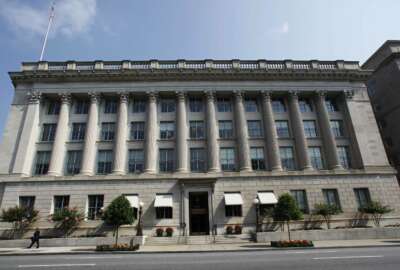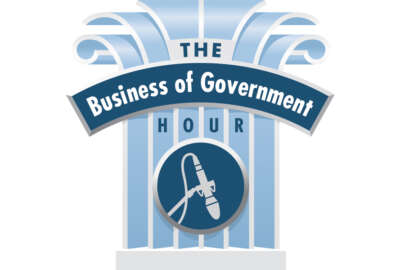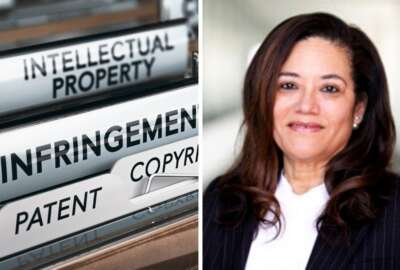
Commerce’s outside advisory board for innovation is up and running again
After a four-year hiatus, the Commerce Department has decided to reestablish an outside advisory board focused on innovation. The National Advisory Council on...
Best listening experience is on Chrome, Firefox or Safari. Subscribe to Federal Drive’s daily audio interviews on Apple Podcasts or PodcastOne.
After a four-year hiatus, the Commerce Department has decided to reestablish an outside advisory board focused on innovation. The National Advisory Council on Innovation and Entrepreneurship is back up and running with 32 new board members picked from industry and academia across the country. Alejandra Castillo is assistant secretary of commerce for economic development. She talked with Federal News Network’s Jared Serbu on the Federal Drive with Tom Temin about what the department wants the board to achieve.
Interview transcript:
Alejandra Castillo: The National Advisory Council on Innovation and Entrepreneurship was actually established back in 2009. It was dormant for four years, but now Secretary Raimondo has re-established and we actually established it officially on May 26 of this year. And we’re looking forward to being able to work with a very wide array of individuals who are experts in their fields in the field of innovation, technology, entrepreneurship, workforce development. And the goal here is to get as much of the council’s recommendation, not only to address the challenges and opportunities of today, but really build that arc of the future as we think about innovation and entrepreneurship. So it’s a very exciting time. It’s, as you may have seen, the members of the council are very diverse in in both geography, expertise, gender, a series of elements that we took into account when we were reviewing the selection process.
Jared Serbu: I want to talk more about the makeup of the council in just a second. But can you say a little bit more about the objectives that they’re going to be trying to tackle? Will they be taking specific direction for issues to study from you or from the secretary? How that how is that all going to work?
Alejandra Castillo: Yes. So we’re, both the secretary and I as well as the co-chairs of the council, will be identifying key areas of both policy opportunities to tackle. As EDA in these last few years, we’ve received several supplementals among them the American rescue plan to begin with, which gave EDA $3 billion. And it’s really leveraging the council’s expertise and background, to better inform EDA, as to not just what’s happening on the ground. But what are the opportunities that are looming on the horizon? I will tell you that, for example, under the America Competes Act, which is currently in Congress and moving through conference, EDA may stand to receive a new program, which is tech hubs. And that’ll give us another piece of conversation in terms of how do we both not only think about tech hubs, what are their impacts? What are the ingredients that need to be in place to have successful tech hubs. These are the type of conversations and discussion points that the council will tackle, and provides recommendations to both EDA and the Department of Commerce.
Jared Serbu: So really, mostly technical advice on how to implement funding that you’re most likely going to end up getting here in addition to what you’ve already gotten from the supplementals.
Alejandra Castillo: Sure, technical advice, advice on how to grow capacity, advice on how to better engage different stakeholders in the ecosystem. And recommendations that can actually bring to EDA new elements that perhaps we haven’t considered, but that they think it’s relevant These are the type of recommendations that we’re going to be very much open to.
Jared Serbu: Going back to the makeup of the board, the initial call for applicants said that you wanted a balanced and diverse set of council members here. Talk a bit more about the range of perspectives that you wanted to have represented and do you feel like you achieved whatever those objectives were.
Alejandra Castillo: Sure. So the range, we wanted to make sure that along with EDA investment policy priorities, where we anchor much of our work around equity, that we brought that same lens to the selection of the advisory board members. So along those lines, we wanted to not just think about what type of industries were being represented, if it were being represented by the members of the advisory board, academia, business, think tanks, community stakeholders, looking at a broad array of different types of populations that we could also think about in terms of incorporating how do we not only think about technology and innovation, but also thinking about it from the lens of both equity and inclusion. So I feel strongly and in a very positive way that we were able to achieve exactly that, and that we are going to have very fruitful conversations but also being able to tackle those areas that not only has the pandemic shone a light on but more importantly the fact that we want to make sure that we build resiliency, that we’re thinking about long term, future opportunities. And then we’re planting the seeds with these types of recommendations to better guide us on both the policymaking as well as the programmatic design.
Jared Serbu: There are a lot of federal advisory committees across the government. And I think sometimes there are instances where the boards or the committees work, the members end up feeling like I wrote a great report, and it’s gonna sit on a shelf somewhere. And there times when they actually do make meaningful change and meaningful policy differences. What’s EDA going to do to make sure that this one is more of the latter than the former?
Alejandra Castillo: Absolutely. And it’s the latter, that we’re looking for. Making sure that these recommendations can be not only timely, but also very helpful in terms of how we move forward. So a couple of things that I will tell you. First of all, making sure that we’re setting the stage. This is something that is of great priority and of high priority to both the secretary and myself. The fact that we are going to make sure that we can outline an effort or a question to be posed to the advisory council, that can actually be concrete and lead to very specific areas of opportunities and recommendations. And then when that report is done, being able to lean on it and making sure that we are going back to that to those recommendations in ways that are not going to be fully determinative, but they will be very informative. So these recommendations are not something that we’re going to put on a shelf and forget about it. Actually, we want to give it life, we want to be able to execute. As well as bringing in as much of the recommendations in other areas of EDA. Our goal is to make EDA stronger, continue to be as responsive to the needs of communities. But more importantly, that we have not only a lens towards equity, but making sure that these recommendations are actionable.
Jared Serbu: Want to take us very slightly off topic in our last couple minutes. But it’s not too off topic, because you mentioned it: tech hubs. I think it’s a super interesting project, my understanding of the general idea is we’re going to try and build up a regionalized or localized approach in places where the tech boom has kind of passed communities by. Tell me if that’s a fair way to put it. But tell me what what EDA’s overall approach to tech hubs is?
Alejandra Castillo: Sure. So first of all, it’s still a lead a piece of legislation that’s moving through Congress, it has not been voted on yet, but we are hopeful that it will come to fruition. And just as you say, I like to say that tech hubs are an opportunity to democratize technology and innovation, so that it doesn’t only live in areas like our coast, whether it’s the East or West Coast, but that we recognize that technology innovation does have a role to play and does really exist in many important ways in so many corners of our country. So making sure that we have regional technology hubs that are incubating both the ideas, the technology, and also working on commercializing those technologies and innovations so that we can unleash that to more businesses, small businesses, and give technology and innovation an opportunity to take life. As well as making sure that the dollars that are supporting technology and innovation doesn’t only go to places like Silicon Valley, or Boston or those areas, but that it actually can start to gravitate to areas around the country that need that type of capital as well. EDA continues to be very focused on the American rescue plan and pushing out $3 billion. Our biggest marquee grant is the build back better challenge which has been an incredible experience, particularly because we received 529 applications, strong applications, but we had to bring it down to 60 finalists. And then the next phase will be the final awardees that has shed some great light, Jared, in terms of what’s happening across the country. The needs, but also the incredible coalitions that were created, to bring forth solutions, and to bring forth areas of with resiliency so that we are better equipped to weather the future shocks. So the American rescue plan has really provided us with incredible learning lessons, but also an acknowledgement of the great sense of purpose, community, economic development, commitment and ideas that are flourishing around the country.
Jared Serbu: That’s Alejandra Castillo, the assistant secretary of commerce for economic development.
Copyright © 2025 Federal News Network. All rights reserved. This website is not intended for users located within the European Economic Area.
Jared Serbu is deputy editor of Federal News Network and reports on the Defense Department’s contracting, legislative, workforce and IT issues.
Follow @jserbuWFED
Related Stories





